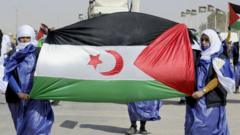Historically, British governments have maintained neutrality regarding the territorial claims in Western Sahara, a region that has seen various international stakeholders involved in its affairs. However, Lammy's recent statement signifies a marked shift in UK policy, as it aligns more closely with Morocco’s interests while heralding the promise of new business opportunities for British firms tied to the upcoming 2030 men's football World Cup, which Morocco is set to co-host with Spain and Portugal.
The revised endorsement follows a strategic agreement that aims to expand cooperation on infrastructure projects, enabling British companies to participate in significant contracts linked to World Cup-related development. Lammy emphasized the potential benefits for UK businesses, stating that these agreements would create "a unique foundation" with access to public tenders within Morocco.
Despite the shift, Algeria, a supporter of the Sahrawi independence movement, expressed regret over the decision, arguing that Morocco's autonomy plan has never been offered as a negotiation basis for the Sahrawi people. The longstanding conflict dates back to Morocco's annexation of Western Sahara in the 1970s, leading to decades of skirmishes with the Polisario Front, which advocates for the region's independence.
While the African Union recognizes Western Sahara's right to sovereignty, a number of countries, including the US and several European nations, have voiced support for Morocco's claims in recent years. The current endorsement from the UK came after extensive discussions that highlighted the importance of self-determination and a renewed commitment to starting negotiations.
Morocco's Foreign Minister welcomed the UK's shift, framing it as a critical step towards a resolution of the dispute. The joint communique released after the meeting also reaffirmed the commitment to peacefully resolving conflicts and respecting self-determination principles.
As the situation unfolds, analysts will be watching closely to see how this diplomatic pivot impacts the complex dynamics in Western Sahara, as well as the broader region’s political landscape.
The longstanding geopolitical stakes and the potential for infrastructure growth tied to the World Cup may well alter the course of negotiations moving forward.
The revised endorsement follows a strategic agreement that aims to expand cooperation on infrastructure projects, enabling British companies to participate in significant contracts linked to World Cup-related development. Lammy emphasized the potential benefits for UK businesses, stating that these agreements would create "a unique foundation" with access to public tenders within Morocco.
Despite the shift, Algeria, a supporter of the Sahrawi independence movement, expressed regret over the decision, arguing that Morocco's autonomy plan has never been offered as a negotiation basis for the Sahrawi people. The longstanding conflict dates back to Morocco's annexation of Western Sahara in the 1970s, leading to decades of skirmishes with the Polisario Front, which advocates for the region's independence.
While the African Union recognizes Western Sahara's right to sovereignty, a number of countries, including the US and several European nations, have voiced support for Morocco's claims in recent years. The current endorsement from the UK came after extensive discussions that highlighted the importance of self-determination and a renewed commitment to starting negotiations.
Morocco's Foreign Minister welcomed the UK's shift, framing it as a critical step towards a resolution of the dispute. The joint communique released after the meeting also reaffirmed the commitment to peacefully resolving conflicts and respecting self-determination principles.
As the situation unfolds, analysts will be watching closely to see how this diplomatic pivot impacts the complex dynamics in Western Sahara, as well as the broader region’s political landscape.
The longstanding geopolitical stakes and the potential for infrastructure growth tied to the World Cup may well alter the course of negotiations moving forward.



















